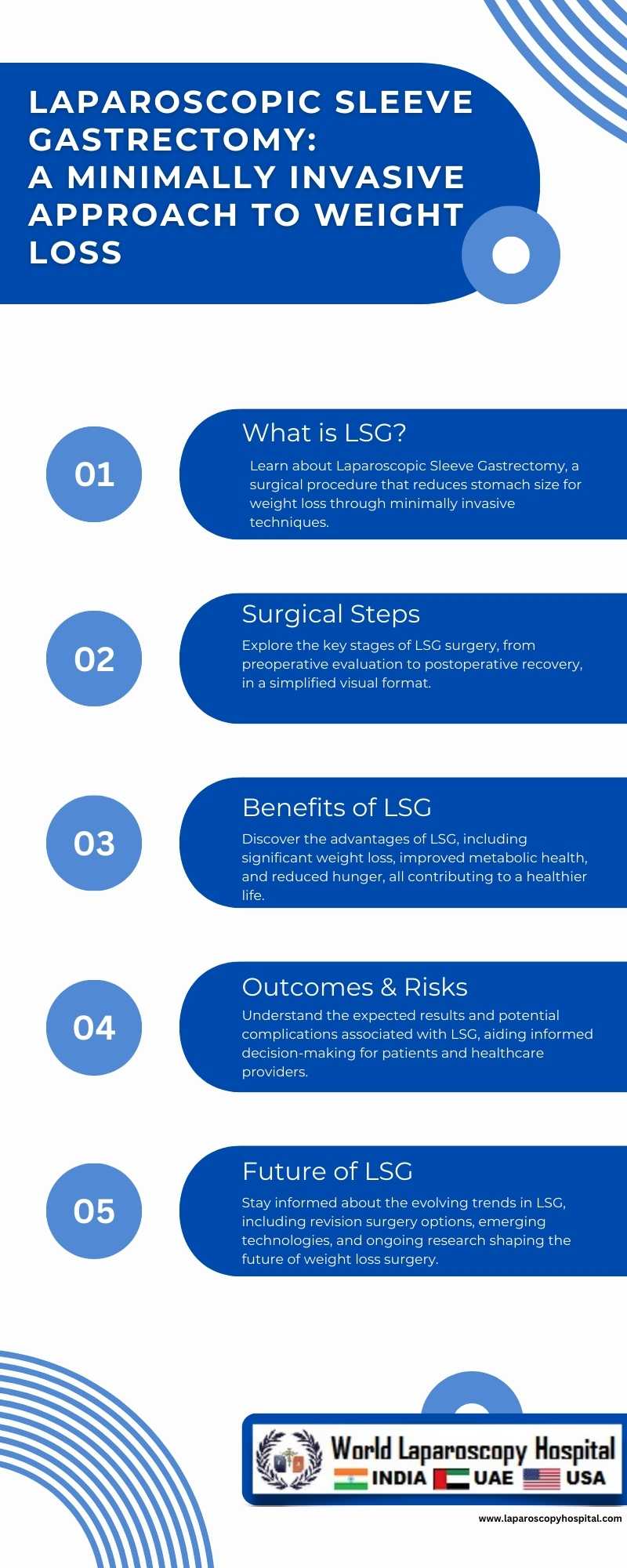Introduction:
In recent years, the prevalence of obesity has reached epidemic proportions worldwide, leading to a growing demand for effective weight loss interventions. Among the various surgical options available, Laparoscopic Sleeve Gastrectomy (LSG) has emerged as a highly successful and minimally invasive approach to combat obesity. This article delves into the intricacies of LSG, its surgical techniques, benefits, outcomes, and the evolving landscape of this procedure in the field of weight loss surgery.

I. Understanding Laparoscopic Sleeve Gastrectomy
Laparoscopic Sleeve Gastrectomy, commonly referred to as sleeve surgery or gastric sleeve, is a bariatric procedure designed to reduce the size of the stomach, restricting food intake, and promoting weight loss. It involves the removal of a significant portion of the stomach, leaving behind a sleeve-shaped stomach pouch. This procedure is minimally invasive, typically performed using small incisions and a laparoscope.
II. The Surgical Technique
A. Preoperative Evaluation
1. Patient Selection Criteria
2. Preoperative Counseling and Education
B. Anesthesia and Trocar Placement
1. General Anesthesia
2. Trocar Placement for Laparoscopic Access
C. Stapling and Resection
1. Staple Line Creation
2. Gastric Resection
D. Closure and Recovery
1. Reinforcing the Staple Line
2. Patient Recovery and Postoperative Care
III. Benefits of Laparoscopic Sleeve Gastrectomy
A. Significant Weight Loss
1. Short-Term Weight Loss
2. Long-Term Weight Maintenance
B. Improved Metabolic Health
1. Resolution of Comorbidities
2. Impact on Diabetes, Hypertension, and Sleep Apnea
C. Reduced Hunger and Appetite
1. Ghrelin Hormone Regulation
2. Psychological Benefits
D. Minimally Invasive Nature
1. Less Pain and Scarring
2. Faster Recovery
IV. Outcomes and Complications
A. Weight Loss and Maintenance
1. Weight Loss Trajectory
2. Factors Affecting Long-Term Success
B. Complications and Risks
1. Early Complications
2. Late Complications
C. Patient Satisfaction and Quality of Life
1. Impact on Psychological Well-being
2. Lifestyle Improvements
V. Evolving Trends in Laparoscopic Sleeve Gastrectomy
A. Revision Surgery
1. Conversion to Gastric Bypass
2. Sleeve Gastrectomy as a Revision Procedure
B. Emerging Techniques and Technologies
1. Robotic-Assisted Sleeve Gastrectomy
2. Single-Incision Sleeve Gastrectomy
C. Ongoing Research and Future Prospects
1. Gut Microbiota and Weight Loss
2. Personalized Medicine in Bariatric Surgery
Conclusion:
Laparoscopic Sleeve Gastrectomy has revolutionized the field of bariatric surgery by offering an effective, minimally invasive approach to weight loss. With its proven benefits in terms of significant weight loss, metabolic improvements, and enhanced quality of life, LSG continues to gain popularity among both patients and surgeons. As advancements in surgical techniques and research continue, the future of LSG holds promise in further improving outcomes and expanding its applicability in the fight against obesity.
In conclusion, Laparoscopic Sleeve Gastrectomy is not just a surgical procedure; it represents a transformative journey toward a healthier and more fulfilling life for those struggling with obesity. As the medical community continues to refine its techniques and understanding of this procedure, the potential for positive outcomes and lasting weight loss continues to grow, offering hope to countless individuals seeking a path to a healthier future.